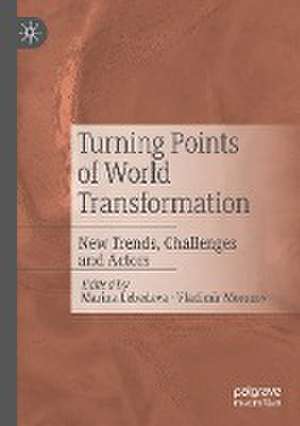Turning Points of World Transformation: New Trends, Challenges and Actors
Editat de Marina Lebedeva, Vladimir Morozoven Limba Engleză Paperback – 19 iun 2023
This book explores the transformation of the political organization of the world as manifest in different spheres of world politics, in particular, in world politics, regional studies, interaction of MNCs and government agencies, and state responses to biogenic challenges. To achieve this goal, M. Lebedeva proposes the concept of a political organization of the world, which in modern conditions is in the process of transformation. The transformation of the political organization of the world is accompanied by megatrends (globalization, integration, democratization) and the opposite trends (de-globalization disintegration, dedemocratization). Interdisciplinary in nature, this book brings together scholars from Russia, the United States, and Canada, and provides a compelling perspective on the geopolitics of our time.
| Toate formatele și edițiile | Preț | Express |
|---|---|---|
| Paperback (1) | 724.56 lei 43-57 zile | |
| Springer Nature Singapore – 19 iun 2023 | 724.56 lei 43-57 zile | |
| Hardback (1) | 728.82 lei 43-57 zile | |
| Springer Nature Singapore – 18 iun 2022 | 728.82 lei 43-57 zile |
Preț: 724.56 lei
Preț vechi: 883.62 lei
-18% Nou
Puncte Express: 1087
Preț estimativ în valută:
138.64€ • 145.14$ • 114.72£
138.64€ • 145.14$ • 114.72£
Carte tipărită la comandă
Livrare economică 07-21 aprilie
Preluare comenzi: 021 569.72.76
Specificații
ISBN-13: 9789811917608
ISBN-10: 9811917604
Pagini: 249
Ilustrații: XV, 249 p. 5 illus., 3 illus. in color.
Dimensiuni: 148 x 210 mm
Greutate: 0.36 kg
Ediția:1st ed. 2022
Editura: Springer Nature Singapore
Colecția Palgrave Macmillan
Locul publicării:Singapore, Singapore
ISBN-10: 9811917604
Pagini: 249
Ilustrații: XV, 249 p. 5 illus., 3 illus. in color.
Dimensiuni: 148 x 210 mm
Greutate: 0.36 kg
Ediția:1st ed. 2022
Editura: Springer Nature Singapore
Colecția Palgrave Macmillan
Locul publicării:Singapore, Singapore
Cuprins
PART I: Non-state actors in state-centrist Westphalian system.- Chapter 1: Introduction: Transformation of the political organization of the world.- Chapter 2: NGOs in the Middle East.- Chapter 3: Smart City – A Global Project of Late Capitalism.- Chapter 4: “Failed" Arab States: Interaction of Non-State Actors and State Structures.- Chapter 5: The Origin, Present State, and Future оf Multipolarity from a Connectivity Perspective.- PART II: Trends in interstate relations in modern world politics.- Chapter 6: Significant Improvement in Relations between Russia and Japan, and Why There Was no Breakthrough.- Chapter 7: Theoretical Perspectives on BRICS: What Kind of an International Institution Is It?.- Chapter 8: Russia and the Arctic Council: towards a new cooperative agenda?.- Chapter 9: The UN And the Middle East Settlement – Mission: Impossible.- PART III: States in the Transforming Political Organization of the World.- Chapter 10: Biopolitical Challenges ofModern World Politics.- Chapter 11: The COVID-19 Health Scare and Its Impact on the US Politics and Society.- Chapter 12: Spatial development, Regional Policy, and Contemporary World Politics.- Chapter 13: Alternative für Deutschland and the Origins of the German Sonderweg.- Chapter 14: The Rise of Euroscepticism in Europe in Time of Crisis in World Politics.
Notă biografică
Marina Lebedeva graduated from the Moscow State University, 1977, received her PhD in 1981 and became Doctor of Political Science in 1993. She is the head of the World Politics Department, Moscow State Institute of International Relations (MGIMO-University). Marina Lebedeva is author and co-author of more than 400 academic publications, including books.
Vladimir Morozov is Associate professor at the Department of Diplomacy and holds the position of Vice-President for HR. He has a PhD in History and has been working at MGIMO since 2002 with a short break in 2004–2007 when he was assigned to the Embassy of the Russian Federation to Israel.
Vladimir Morozov is Associate professor at the Department of Diplomacy and holds the position of Vice-President for HR. He has a PhD in History and has been working at MGIMO since 2002 with a short break in 2004–2007 when he was assigned to the Embassy of the Russian Federation to Israel.
Textul de pe ultima copertă
This book explores the transformation of the political organization of the world as manifest in different spheres of world politics, in particular, in world politics, regional studies, interaction of MNCs and government agencies, and state responses to biogenic challenges. To achieve this goal, M. Lebedeva proposes the concept of a political organization of the world, which in modern conditions is in the process of transformation. The transformation of the political organization of the world is accompanied by megatrends (globalization, integration, democratization) and the opposite trends (de-globalization disintegration, dedemocratization). Interdisciplinary in nature, this book brings together scholars from Russia, the United States, and Canada, and provides a compelling perspective on the geopolitics of our time.
Marina Lebedeva graduated from the Moscow State University, 1977, received her PhD in 1981 and became Doctor of Political Sciencein 1993. She is the head of the World Politics Department, Moscow State Institute of International Relations (MGIMO-University). Marina Lebedeva is author and co-author of more than 400 academic publications, including books.
Vladimir Morozov is Associate professor at the Department of Diplomacy and holds the position of Vice-President for HR. He has a PhD in History and has been working at MGIMO since 2002 with a short break in 2004–2007 when he was assigned to the Embassy of the Russian Federation to Israel.
Vladimir Morozov is Associate professor at the Department of Diplomacy and holds the position of Vice-President for HR. He has a PhD in History and has been working at MGIMO since 2002 with a short break in 2004–2007 when he was assigned to the Embassy of the Russian Federation to Israel.
Caracteristici
The book focuses on a wide field of study of world politics and international relations The book offers a model of the modern transformation of the political organization of the world Scientific and practical nature of the research ensures its high theoretical and empirical value
